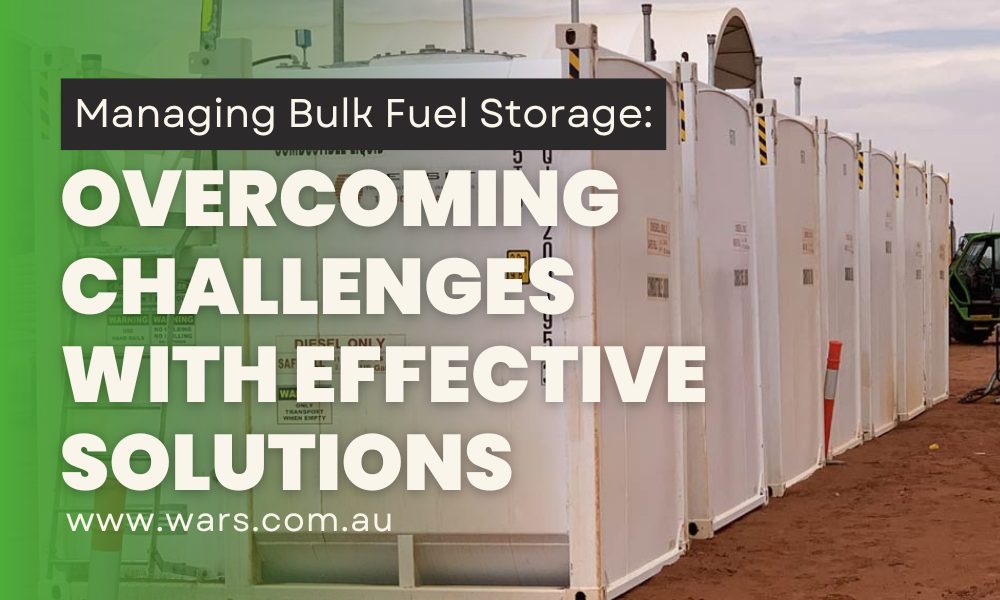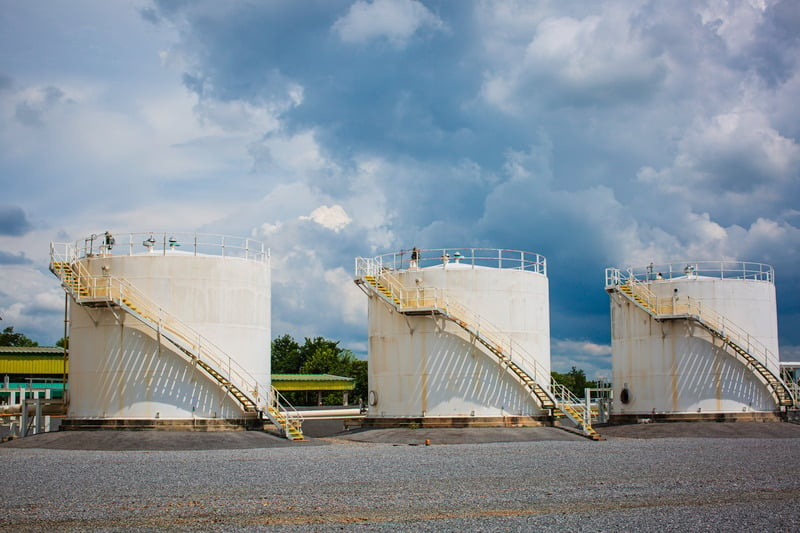
Bulk fuel storage plays a vital role in industries that depend on a constant fuel supply, such as construction, agriculture, logistics, and power generation. However, managing bulk fuel storage tanks presents unique challenges, including regulatory compliance, fuel quality preservation, safety risks, and efficient storage and distribution. To optimise fuel management, it’s essential for businesses to understand the complexities of fuel storage solutions and apply best practices.
At WA Refuelling, we specialise in helping businesses address these challenges. In this article, we’ll explore common obstacles in bulk fuel storage and strategies for overcoming them effectively.
Understanding Bulk Fuel Storage: Why It Matters
Storing fuel in large quantities offers numerous advantages, especially for companies that need immediate access to diesel, petrol, or other fuel types. Bulk fuel storage allows for uninterrupted operations, cost savings through bulk purchasing, and better control over fuel quality. However, storing fuel in large quantities also necessitates careful planning to ensure storage safety, fuel integrity, and compliance with environmental regulations.
Key Challenges in Bulk Fuel Storage
Managing bulk fuel storage comes with several complex challenges that require careful attention to ensure efficient operations and regulatory compliance. Here are some of the primary issues businesses face in maintaining safe and effective fuel storage solutions.
-
Fuel Degradation and Quality Control
Over time, fuel stored in bulk fuel storage tanks can degrade, which affects its efficiency and performance. Diesel, for instance, is susceptible to microbial contamination, which can lead to the formation of sludge in tanks. Exposure to temperature fluctuations, water accumulation, and oxygen can accelerate fuel degradation, causing issues in engines and machinery if left unmanaged.
-
Safety and Compliance
Storing fuel in bulk carries significant safety risks, including the potential for fire hazards, spills, and leaks. Ensuring safe storage practices is essential to prevent accidents and mitigate environmental damage. Bulk fuel storage is heavily regulated, and companies must comply with various health, safety, and environmental regulations to ensure safe handling, storage, and disposal of fuel.
-
Fuel Theft and Security Concerns
Bulk fuel storage can be an attractive target for theft, particularly in remote or unsecured areas. The loss of fuel through theft not only impacts operational costs but can also compromise the safety of the storage facility if tanks are tampered with. Securing fuel storage solutions is therefore crucial to protect assets and prevent unauthorised access.
-
Tank Maintenance and Monitoring
Regular maintenance and monitoring of bulk fuel storage tanks are essential to ensure they remain in good condition. Tanks are prone to rust, corrosion, and leaks, particularly if they’re older or exposed to harsh environmental conditions. Poorly maintained tanks increase the risk of fuel contamination and leaks, which can be costly to remediate.
-
Environmental Concerns
Spills or leaks from fuel storage tanks can have severe environmental consequences, contaminating soil, groundwater, and nearby water sources. For companies storing large volumes of fuel, the risk of accidental spills means adhering to strict environmental standards and having preventive measures in place to protect the surrounding ecosystem.
Effective Solutions for Managing Bulk Fuel Storage

Despite the challenges, effective strategies can streamline the management of bulk fuel storage, ensuring safe, efficient, and compliant fuel storage. Here’s a look at some practical fuel storage solutions:
-
Regular Fuel Testing and Filtration
Regular fuel testing is essential for maintaining fuel quality and preventing contamination. Through periodic testing, companies can detect issues such as microbial contamination, water accumulation, and particulate matter in the fuel. Fuel filtration systems can further help remove contaminants, ensuring that fuel remains in optimal condition and minimising the risk of equipment damage.
-
Installing High-Quality Storage Tanks
Investing in high-quality bulk fuel storage tanks designed to resist corrosion and withstand environmental conditions can help prevent leaks and spills. Modern fuel storage tanks are built with advanced materials and may include double-walled designs, built-in leak detection systems, and secondary containment features to enhance safety.
-
Implementing Fuel Management Systems
Fuel management systems provide real-time monitoring of fuel levels, usage, and tank conditions. By implementing these systems, companies can track fuel consumption, detect leaks, and monitor tank health remotely. Many fuel management solutions include alert systems that notify operators of low fuel levels, potential contamination, or safety hazards, allowing for prompt action.
-
Security Measures for Preventing Theft
Securing fuel storage areas with fencing, surveillance cameras, and controlled access points can help deter theft. Additionally, fuel management systems with access controls can track usage and identify unauthorised access, further preventing fuel loss. Using tamper-proof seals and locks on fuel tanks can also add an extra layer of protection.
-
Regular Tank Inspections and Maintenance
Routine inspections and maintenance are critical for ensuring that bulk fuel storage tanks remain in good condition. Inspections can help identify early signs of corrosion, leaks, or other damage, allowing for timely repairs. Routine maintenance, including cleaning and inspecting for wear and tear, can extend the lifespan of tanks and reduce the likelihood of fuel contamination.
-
Proper Ventilation and Temperature Control
Temperature fluctuations can accelerate fuel degradation, especially in outdoor storage tanks. Proper ventilation and temperature control systems can help maintain a stable environment within tanks, reducing the risk of fuel breakdown. In hot climates, shade structures or cooling systems may be needed to protect fuel quality, while in colder regions, tank heaters can prevent gelling and maintain fuel flow.
-
Comprehensive Spill Response Plan
Having a comprehensive spill response plan is essential for managing accidental spills. The plan should include procedures for immediate containment, cleanup, and reporting. Spill kits, absorbent materials, and barriers should be available on-site to address minor spills quickly. Staff should also be trained in spill response techniques to ensure that any spill is managed efficiently and safely.
-
Automated Inventory Management
Automated inventory management systems help track fuel usage, detect low levels, and schedule refills based on actual demand. With automated systems, businesses can optimise fuel deliveries, reducing the need for emergency refills and ensuring uninterrupted operations. Automated inventory management also enhances budgeting accuracy by providing detailed fuel usage data over time.
Choosing the Right Fuel Storage Solutions
Selecting the right fuel storage solutions requires careful consideration of storage needs, location, and environmental factors. Here are some factors to consider:
- Storage Capacity and Usage Patterns: Determine your fuel consumption rate to select an appropriately sized storage tank. Oversized tanks may increase the risk of fuel degradation, while undersized tanks may require more frequent refills. Analysing usage patterns and forecasting fuel needs can help you find the right balance for your bulk fuel storage.
- Compliance with Local Regulations: Fuel storage regulations vary depending on location and industry. Ensure that your storage setup complies with local, state, and federal regulations regarding fuel storage, spill containment, and safety. Non-compliance can lead to costly fines, so working with a provider knowledgeable in regulatory requirements is beneficial.
- Storage Location and Environmental Protection: Location plays a significant role in fuel storage management. Consider installing tanks in a location that minimises exposure to extreme weather conditions. Proper tank placement and containment solutions can help protect against environmental contamination, safeguarding soil and groundwater.
- Selecting a Reliable Fuel Supplier: A dependable fuel supplier can make fuel management easier, offering services such as scheduled fuel deliveries, monitoring, and emergency refills. Working with a reliable fuel supplier ensures that you’ll have consistent access to fuel, minimizing downtime due to fuel shortages and reducing operational disruptions.
Take Charge of Your Fuel Storage Needs with WA Refuelling
Managing bulk fuel storage effectively is key to ensuring consistent operations, maintaining compliance, and upholding safety standards. By addressing fuel quality, security, maintenance, and environmental concerns proactively, businesses can prevent costly disruptions and improve operational efficiency. Implementing best practices, such as regular testing, enhanced security measures, and automated monitoring, can transform fuel storage from a challenge to an advantage.
WA Refuelling offers expert support and tailored solutions to help you overcome the challenges of bulk fuel storage. Let us partner with you to secure, streamline, and sustain your fuel management. Contact us on (08) 9359 1988 to explore our comprehensive services and ensure your operations run smoothly with confidence.
